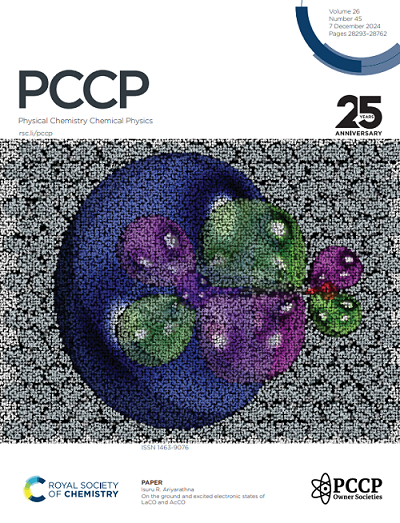用助溶剂调节主客体包封的自由能
IF 2.9
3区 化学
Q3 CHEMISTRY, PHYSICAL
引用次数: 0
摘要
超分子宿主创造了独特的微环境,可以通过空间限制和静电调节反应。研究表明,“疏水腔内的溶剂成型”是纳米笼主体中客体包封的重要热力学驱动力。在这里,我们表明,即使溶剂成分的微小变化(5%)也会对封装的自由能产生深远的影响。在太赫兹、核磁共振和从头算MD的联合研究中,研究人员发现,当DMSO添加量≥5%时,单个DMSO分子在腔内的优先停留导致ΔS从63-76 cal⋅mol-1⋅K-1到23-24 cal⋅mol-1⋅K-1的显著变化。由于DMSO分子优先存在于空腔中,因此可以通过减少空腔体积来合理化。这些结果为客体结合相互作用提供了新的见解,强调了即使溶剂成分的微小变化也会显著影响熵驱动力。嵌入单个DMSO分子的影响远远超过了金属配体的替代选择。我们证明了笼内的局部溶剂组成对于调节催化效率是必不可少的,因此溶剂调节可能在催化和化学分离的超分子化学中实现新的应用。本文章由计算机程序翻译,如有差异,请以英文原文为准。
Tuning the Free Energy of Host-Guest Encapsulation by Cosolvent
Supramolecular hosts create unique microenvironments which enable the tuning of reactions via steric confinement and electrostatics. It has been shown that “solvent shaping inside hydrophobic cavities” is an important thermodynamic driving force for guest encapsulation in the nanocage host. Here, we show that even small (5%) changes in the solvent composition can have a profound impact on the free energy of encapsulation. In a combined THz, NMR and ab initio MD study, we reveal that the preferential residing of a single DMSO molecule in the cavity upon addition of ≥5% DMSO results in a considerable change of ΔS from 63-76 cal⋅mol–1⋅K–1 to 23-24 cal⋅mol–1⋅K–1. This can be rationalized by reduction of the cavity volume due to the DMSO molecule which resides preferentially in the cavity. These results provide novel insights into the guest-binding interactions, emphasizing that the entropic driving force is notably influenced by even small changes in the solvent composition. The impact of embedding a single DMSO molecules exceeds the alternative choice of the metal ligand by far. We demonstrate that the local solvent composition within the cage is essential for regulating catalytic efficiency, thus solvent tuning might enable novel applications in supramolecular chemistry in catalysis and chemical separation.
求助全文
通过发布文献求助,成功后即可免费获取论文全文。
去求助
来源期刊

Physical Chemistry Chemical Physics
化学-物理:原子、分子和化学物理
CiteScore
5.50
自引率
9.10%
发文量
2675
审稿时长
2.0 months
期刊介绍:
Physical Chemistry Chemical Physics (PCCP) is an international journal co-owned by 19 physical chemistry and physics societies from around the world. This journal publishes original, cutting-edge research in physical chemistry, chemical physics and biophysical chemistry. To be suitable for publication in PCCP, articles must include significant innovation and/or insight into physical chemistry; this is the most important criterion that reviewers and Editors will judge against when evaluating submissions.
The journal has a broad scope and welcomes contributions spanning experiment, theory, computation and data science. Topical coverage includes spectroscopy, dynamics, kinetics, statistical mechanics, thermodynamics, electrochemistry, catalysis, surface science, quantum mechanics, quantum computing and machine learning. Interdisciplinary research areas such as polymers and soft matter, materials, nanoscience, energy, surfaces/interfaces, and biophysical chemistry are welcomed if they demonstrate significant innovation and/or insight into physical chemistry. Joined experimental/theoretical studies are particularly appreciated when complementary and based on up-to-date approaches.
 求助内容:
求助内容: 应助结果提醒方式:
应助结果提醒方式:


